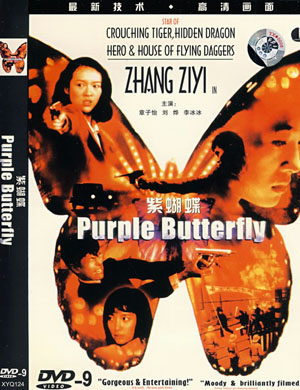
PURPLE BUTTERFLY
China, 2003, 125 minutes, Colour.
Zhang Ziyi, Liu Ye, Feng Juanzheng, Toru Nakamura, Li Bing Bing.
Directed by Lou Ye.
Portrait of a significant phase in Chinese history, Manchuria in the late 1920s and the Japanese occupation during the 1930s. One of the difficulties for a western audience is the unfamiliarity with the period and the effort to identify the characters easily. However, the director creates an atmosphere, presents us with characters who are passionate and who eventually make decisions that lead them into dangerous conspiracies and rebellion. A confused shooting spree at a railway station is a highlight of the film. Audiences can appreciate the Chinese feeling of humiliation, the arrogance of the Japanese towards the Chinese and the plight of individuals caught up in movements far bigger than themselves.
1. The history of the Japanese relationship with China, the occupation of Manchuria in the 20s, the invasion in the 30s leading to the Rape of Nanking, the occupying of Shanghai and the attacks in World War II? Audience familiarity? The impact for a Chinese audience? International audience?
2. The re-creation of Shanghai and Manchuria in the 20s and 30s? Locations, buildings, costumes and décor? Atmosphere? Music?
3. The Chinese resistance to the Japanese? The significance of the title, the emblem? The rebel movement?
4. The complexities of the plot: the structure and the opening in the 20s, the moving to three years later and Shanghai, the aftermath, the final images of archival footage of the sufferings in the late 30s?
5. The complexity of the plot, the characters, moving from one to another? The entanglement of their lives? The violence, the innocent victims, the rebels? The finale and the confrontation?
6. The opening, the factories, Itami and his presence in China, his attraction for Cynthia, their meeting, his having to leave, her grief? The irony of his return as a Japanese agent? His ruthlessness, reporting to the chief, the singling out of the rebels? The final confrontation with Cynthia, having got to know her again, suspicious, her working against him? The shootings?
7. Cynthia and the passing of time, the transition from a schoolgirl, the death of her brother by the fanatic Japanese, the effect, going into the Purple Butterfly, going on missions, the massacre at the station, getting to know Itami again, leading him on, her feelings, her loyalty to Xye Ming? Her going through with the attack, the dance - and the revelation that Itami understood? The relationship with Xye Ming? Her future?
8. The alternate story with Szeto and Yi Ling? Her working the phones, Szeto and his work, their love, the dancing? Her death in the raid? Szeto and his being mistaken for the spy, his being taken and tortured, the request for information? His desperation and his bringing the gun at the finale?
9. Xie Ming and the other leaders of the Purple Butterfly, the preparation of the massacre, its execution? His relationship with Cynthia? Her loyalty, the sexual relationship? In the aftermath of the attack? Their being together - a future?
10. The differing styles of the film, the long silent close-ups, communication of character by the images and the faces? The contrast with the action?
11. The necessity of reviewing Chinese history and the relationship with the Japanese long after the events?